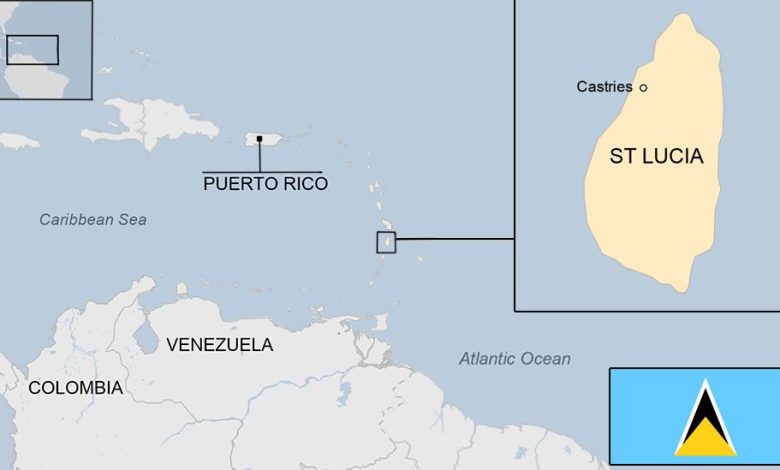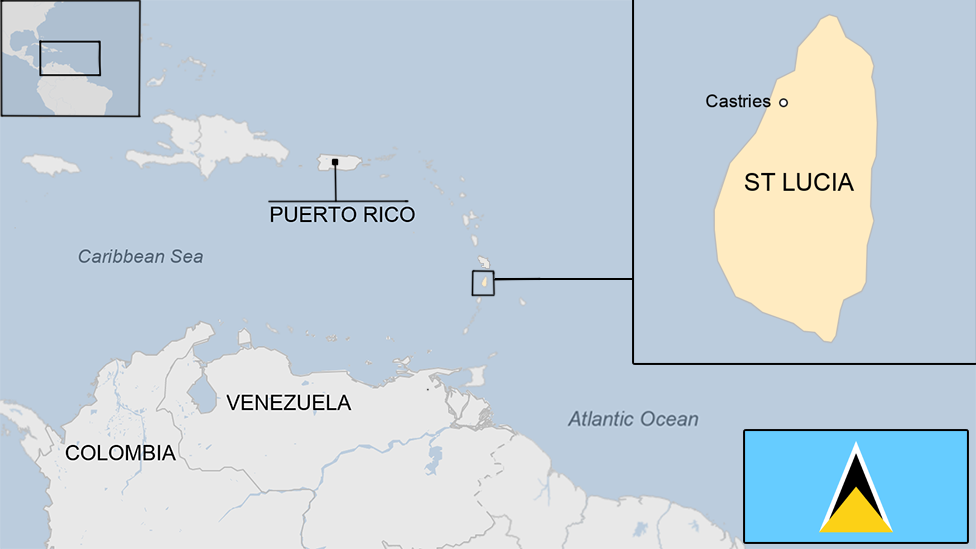Detailed Introduction to the Country of Saint Lucia: A Tropical Paradise

Saint Lucia is a small island in the Caribbean. It is known for its beauty and charm. This article will give you a detailed introduction to this lovely country.
Geography of Saint Lucia
Saint Lucia is located in the Caribbean Sea. It is part of the Lesser Antilles. The island is known for its volcanic landscape and lush rainforests. The capital city is Castries. The island covers an area of 617 square kilometers.
Location
Saint Lucia is north of Saint Vincent and the Grenadines. It is south of Martinique. The island is close to the equator. This gives it a warm tropical climate.
Climate
The climate in Saint Lucia is tropical. It is warm all year round. There are two main seasons: the dry season and the wet season. The dry season is from December to May. The wet season is from June to November. Hurricanes can occur during the wet season.
History of Saint Lucia
Saint Lucia has a rich history. The island was originally inhabited by the Arawak and Carib peoples. European explorers arrived in the 15th century. The island changed hands many times between the French and the British.
Early History
The Arawak people were the first inhabitants. They were later replaced by the Caribs. The Caribs called the island “Iouanalao”. This means “Land of the Iguanas”.
Colonial Period
Christopher Columbus sighted the island in 1502. The French established the first European settlement in 1660. The British and French fought over the island for many years. Saint Lucia changed hands 14 times. It was known as the “Helen of the West Indies”.
Independence
Saint Lucia gained independence from the United Kingdom on February 22, 1979. Today, it is a member of the Commonwealth of Nations.

Credit: www.britannica.com

Credit: www.bbc.com
Culture of Saint Lucia
Saint Lucia has a vibrant culture. It is influenced by African, French, and British traditions. The island is known for its music, dance, and festivals.
Language
English is the official language. Many people also speak Saint Lucian Creole French. This is a mix of French and African languages.
Music And Dance
Music is an important part of Saint Lucian culture. Popular styles include calypso, soca, and reggae. The island is also known for its traditional folk music. Dance is often a part of celebrations and festivals.
Festivals
Saint Lucia hosts many festivals. The biggest is the Saint Lucia Carnival. This takes place in July. Other popular festivals include the Saint Lucia Jazz Festival and the Jounen Kwéyòl (Creole Day).
Tourist Attractions in Saint Lucia
Saint Lucia is a popular tourist destination. It has many attractions for visitors to enjoy.
The Pitons
The Pitons are two volcanic mountains. They are a UNESCO World Heritage Site. Visitors can hike to the top for stunning views.
Soufrière
Soufrière is a town on the west coast. It is home to many attractions. These include the Sulphur Springs and Diamond Falls Botanical Gardens.
Marigot Bay
Marigot Bay is a beautiful natural harbor. It is a popular spot for yachting and sailing. The bay has been featured in several movies.
Pigeon Island National Park
Pigeon Island is a national park. It has historical ruins and beautiful beaches. Visitors can explore the old fort and enjoy the scenery.
Anse Chastanet
Anse Chastanet is a famous beach. It is known for its clear waters and coral reefs. It is a great spot for snorkeling and diving.
Food in Saint Lucia
Saint Lucian cuisine is a blend of different influences. The food is delicious and diverse.
Popular Dishes
- Green Fig and Saltfish: This is the national dish. It is made with green bananas and salted fish.
- Callaloo Soup: A soup made with leafy greens and sometimes crab meat.
- Accra: Fried fish cakes made with salted cod.
- Bouyon: A hearty stew made with meat, vegetables, and dumplings.
Fruits And Vegetables
Saint Lucia is rich in tropical fruits and vegetables. Common fruits include mangoes, papayas, and bananas. Vegetables such as dasheen, yams, and breadfruit are also popular.
Economy of Saint Lucia
Saint Lucia has a mixed economy. Tourism is the main industry. Agriculture and manufacturing also play important roles.
Tourism
Tourism is the largest industry in Saint Lucia. The island attracts visitors with its beautiful landscapes and resorts. Many people come to enjoy the beaches and natural attractions.
Agriculture
Agriculture is important to the economy. Bananas are the main export crop. Other crops include coconuts, cocoa, and vegetables.
Manufacturing
Manufacturing is a smaller part of the economy. It includes the production of clothing, beverages, and electronics.
Education in Saint Lucia
Education is important in Saint Lucia. The government provides free education for children.
Primary And Secondary Education
Children attend primary school from ages 5 to 12. After primary school, they go to secondary school. Secondary education lasts for five years.
Higher Education
There are options for higher education in Saint Lucia. The Sir Arthur Lewis Community College offers various programs. Some students also study abroad.
Frequently Asked Questions
What Is Saint Lucia Known For?
Saint Lucia is renowned for its stunning beaches, lush rainforests, and the iconic Pitons mountains.
Where Is Saint Lucia Located?
Saint Lucia is located in the Eastern Caribbean, north of Saint Vincent and the Grenadines.
What Language Is Spoken In Saint Lucia?
English is the official language, while Saint Lucian Creole French is also widely spoken.
What Is The Capital Of Saint Lucia?
The capital of Saint Lucia is Castries, a bustling city with rich history and culture.
Conclusion
Saint Lucia is a beautiful and vibrant country. It has a rich history and culture. The island offers many attractions for visitors. Whether you are interested in nature, history, or relaxation, Saint Lucia has something for everyone.




